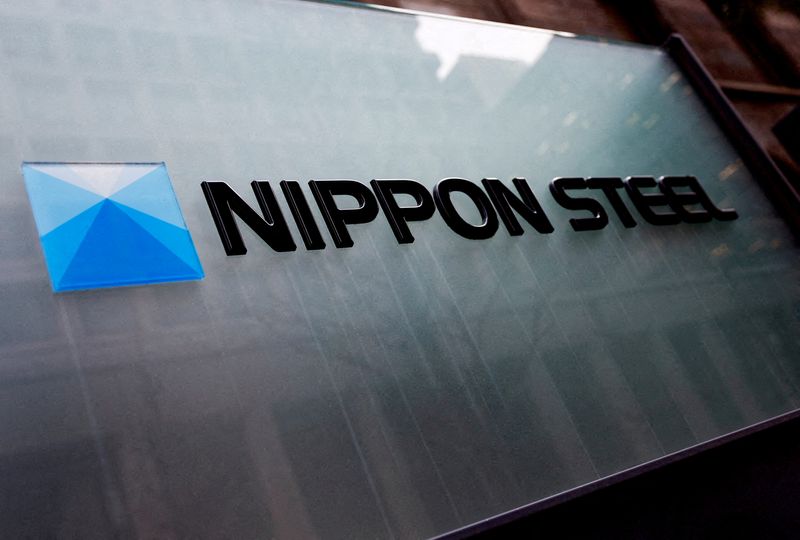By Alexandra Alper and Atreya Dasgupta
(Reuters) – U.S. President Joe Biden violated the Constitution by blocking Nippon Steel’s $14.9 billion bid to buy US Steel through a sham national security review, the companies alleged in a lawsuit they said they filed on Monday.
The companies want a federal court to overturn Biden’s decision to scuttle the deal so they can secure another chance at approval through a new national security review unconstrained by political influence.
The lawsuit alleges that Biden violated the Committee on Foreign Investment in the United States, which screens foreign investments for national security risks, and violated the companies’ right to fair review.
The merger has become highly politicized ahead of the US presidential election in November, with both Democrat Biden and Republican President-elect Donald Trump vowing to kill it as they seek to woo voters in the swing state of Pennsylvania where US Steel is headquartered. United Steelworkers union President David McCall opposed the connection.
Both Trump and Biden stressed that the company should remain US-owned even after the Japanese company offered to move its US headquarters to Pittsburgh, where the US steelmaker is based, and promised to respect all agreements concluded between US Steel and USW.
The companies allege that Biden sought to cancel the deal “to curry favor with USW leadership in Pennsylvania in his re-election bid.”
“As a result of President Biden’s undue influence to advance his political agenda, CFIUS failed to conduct a good faith regulatory review process focused on national security,” the companies said in a statement announcing the lawsuit.
The White House did not immediately respond to a request for comment. Trump said in a post on his social media platform: “Why would they want to sell US Steel now when tariffs make it a more profitable and valuable company?”
The lawsuit, which mirrors claims the companies made in a Dec. 17 letter to CFIUS obtained by Reuters, shows that the companies are making good on their threats of litigation and will continue to fight for the deal to be approved.
“We cannot back down after being treated unreasonably. We will resist strongly,” Takahiro Mori, vice chairman of Nippon Steel, said in an interview on Monday.
Mori said that the review process conducted by CFIUS lacked integrity, as the Japanese company did not receive any written comments on the proposed national security agreement that it voluntarily submitted, and there were no questions or concerns expressed by CFIUS during its meetings. Multiple, Nikki reported.
The outlook is unclear for the lawsuit, which also targets Attorney General Merrick Garland and Treasury Secretary Janet Yellen, who oversees the Committee on Foreign Investment in the United States. Experts say courts generally give too much weight to CFIUS in defining national security.
The companies also filed a second lawsuit against rival bidder Cleveland-Cliffs (NYSE:), its CEO Lourenco Goncalves, and USW President David McCall “for their unlawful and coordinated actions” aimed at blocking the deal.
They say Cliffs, Goncalves and McCall colluded in an “illegal campaign” to allow Cliffs to “monopolize domestic steel markets” by thwarting any further attempts to buy US Steel.
Reuters reported on Sunday that Goncalves participated in at least nine calls to reassure investors that Biden would thwart the Nippon Steel merger, according to a letter last month to the Committee on Foreign Investment in the United States.
The companies are seeking an injunction against further “anti-competitive” behavior as well as billions of dollars in damages.
McCall said the USW is reviewing the complaint and will “vigorously defend against these baseless allegations.” The Justice Department, Treasury Department and Cleveland also did not immediately respond to requests for comment.
Last week, Biden blocked the proposed purchase over national security concerns, dealing a potentially fatal blow to the controversial plan after a year of review.

US Steel, founded in 1901 by some of America’s biggest magnates, including Andrew Carnegie, J.P. Morgan, and Charles Schwab (NYSE:), became entangled with the industrial recovery following the Great Depression and World War II.
The company has been under pressure after several quarters of declining revenues and profits, making it an attractive takeover target for competitors looking to expand their share of the US market.
https://i-invdn-com.investing.com/news/LYNXNPEC0E0NI_L.jpg
Source link